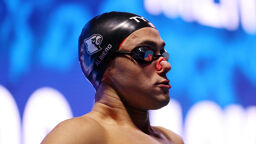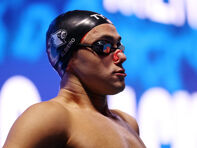I remember standing in the corner at a house party with dozens of people I barely knew on a Saturday night in September 2010. I was 17, closeted, and anxiously trying not to seem weird while I was on my first college recruiting trip.
I wanted to be a part of this team, so I needed them to like me. I was insecure because I was quieter than most, very socially anxious, and knew I didn’t look or sound like most girls wanted to.
I kept telling myself if I did what everyone else was doing, or what most normal girls were supposed to like, then everything might be OK. It was just another way to convince myself that I wasn’t gay, because that would be too much on top of everything else I didn’t like about myself.
I came out in my junior year while swimming in the NCAA. I’ve written a lot about the positives in that journey and how it made me better in the end, but this isn’t the same kind of feel-good story. It isn’t about how coming out made my life better.
It’s about overcoming the destructive coping mechanisms I developed when I was a closeted athlete, trying to fit in and be “normal.” The heart of this story comes down to one warm beer on that Saturday night in 2010, how it has followed me for my adult life, and the long road to healing and accepting the parts of myself that I drowned in alcohol.
When I was younger, I was always worried about losing people who wouldn’t accept me for who I am, or opening myself up to criticism from the world. When I accepted that first drink, I started to feel things I didn’t think were possible. One warm beer turned into another, then to mixed drinks.
Something so simple had suddenly relieved me of all the crippling depression, insecurity, and anxiety that felt impossible to shoulder at times. I had never experienced anything that could make me feel so carefree, confident, and comfortable. It felt easy to say whatever I wanted to say to people, make them laugh, and not worry about what anyone else was thinking of me. I finally fit in, and that thrill of being drunk was something I could never have imagined.
The problem is, the euphoria doesn’t last. I never stopped chasing the feeling I had that night. What I didn’t realize at 17 was that there was a price to be paid for using alcohol to numb my hardships.
Now, at 30 years old, I’ve run up quite a debt. I can see the ways I used alcohol to ease my anxieties about coming out. In 2023, there’s a level of comfort to being out that I didn’t have back in 2014. But being gay has still come with a lot of painful experiences. I didn’t want to hurt anymore. I didn’t want to believe that people could be so cruel because of my differences. So I drank.
I drank to feel normal and carefree again. I drank to give myself a few hours of life without the overwhelming anxiety and depression I had been pushing down. I drank because when the alcohol didn’t take away the pain, it made it easier for me to somehow let out those feelings.
Of course, there were consequences to that. It was easier to write them off as “just bad nights” than to admit I had a bigger issue. Because admitting that I was abusing alcohol meant that I would have to give up that crutch, and all at once I would feel so many painful things I’ve kept in the back of my mind since I was 17.
Here’s the most dangerous thing about alcohol for me: it’s instantaneous. And the second I become afraid that it might wear off, I drink more and more.
Hurting while you’re sober is hard and scary. I was never good at being patient, and I’ve never been good at giving myself any grace when I feel bad about myself. I remember nights of feeling desperately sad and afraid, thinking those feelings were instantly relieved by alcohol. Now I can see those feelings have been with me this entire time.
I thought after I came out, and came to terms with the fact that not everyone would accept me, that the worst of it was over. As I’ve gone through the last several years of my life, I’ve realized that problem never really went away. This is an ongoing struggle in my life.
It’s not just that I’m openly gay. It’s that I look like I’m gay. I sound like I’m gay. I don’t dress the same way as other women and I’ve never really been the most feminine. To some people, that’s too much. They worry about how being associated with me may look to other people.
Over the years, I’ve been deeply hurt in unexpected ways by some of my closest friends. Now I realize at 30 that I’ve still been drinking for the same reasons I drank at 17. I just wanted to feel loved and accepted, but I don’t know that I’ll have that if I’m just being myself.
I’ve had too many people tell me I was one of their closest friends, that they see me like family, or that they love me so much, only to have those people turn around and tell others that I was weird, or obsessed with them, or they couldn’t stand me. Most of the time, they outright denied it to my face, making me think I was being crazy or dramatic for feeling like something was off when they did something wrong. They wanted to keep me as a friend, but needed to make sure everyone knew we weren’t together or that they didn’t really want to associate with someone who was so different.
It’s easy to become consumed by something that can take away our deepest insecurities, even if it’s only for a few hours. As members of the LGBTQ community, we often suffer in ways that our loved ones aren’t able to understand. We may struggle with self-loathing that comes with internalizing anti-gay stigmas.
There are many of us who have dealt with internalized homophobia regardless of whether or not our loved ones were accepting or supportive. Drinking or using drugs may feel like the only way to mitigate the pain or lessen the judgments we make against ourselves. It can feel shameful to talk about these things with others, even when there is nothing to be ashamed of. It’s easier to use drugs or alcohol to feel comfortable in your own skin than it is to admit that there are things you don’t like about yourself, especially when the things you dislike are so integral to who you are.
Getting drunk and blaming myself was easier than accepting that people can be dishonest, cold, hurtful, bigoted and manipulative. Blaming myself meant that there was something fundamentally wrong with me that was in my control to fix, and that if I changed, the people I loved would see that I was still worth being friends with, despite my differences.
I’ve felt unsafe in most of my relationships, to the point that I wanted to drink when I was around people, just so I could feel normal and relaxed for a while. I still don’t know how to accept love or compliments without alcohol. Being drunk made it easier to accept my failings in my relationships and my athletic career that came with being in the closet and persisted throughout my adult life. It makes it easier to feel things, both amazing highs and devastating lows. But eventually the highs are few and far between, and the lows become unbearably dark. The cycle only gets worse, and it never ends until you choose to end it.
I’m not sure things will ever be completely easy when it comes to being gay and being treated differently, but I am sure I’ve made it harder for myself by choosing alcohol in moments that I could have chosen personal growth.
It’s been hard to process all of the anxieties and the things that hurt me, because they never really went away. I have days when I can see things clearly and know I’m doing my best. I try to forgive myself when I make mistakes, and understand that many of them come from a place of trauma that’s been amplified through years of unhealthy coping mechanisms.
Sometimes I feel like I’d much rather just go back to my old habits. Some things that felt easy to do when I was drunk, now feel extremely challenging. I think what finally changed things for me was realizing that whatever pain and anxiety I’m going to have to deal with is better and more rewarding than living with more regrets.
I don’t regret losing the things or people I was afraid of losing when I was drinking. I regret the things I put myself through when I was trying to keep such unhealthy relationships. I regret wasting time trying to be good enough for people who treated me poorly because they were insecure about themselves.
I wish this story had a more concrete and happy ending, like many of the others I’ve written. But realistically I don’t even have any idea how I’m going to feel tomorrow. This is far from over, and choosing not to drink to escape life’s hardships is a conscious decision I will have to make for the rest of my life.
And just as important, I have to choose to forgive myself when I make mistakes, and to give myself the same care and grace that I’ve given to others in the past. I may not be healed or fully better right now, but I am starting to accept myself for who I am. I’m gay and I’m anxious, but I am not drunk. I’m OK with that.
Lauren Neidigh is a former NCAA swimmer at the University of Arizona and the University of Florida. She was an Olympic Trials qualifier and Florida 1A state champion before going on to coach for Loggerhead Aquatics in her hometown of Jacksonville. She was also a reporter for SwimSwam news for several years. Lauren got her M.S. in Criminology from Florida State University and has since moved into the mental health field. She now works as a psychiatric evaluator in the emergency department at UF Health. She can be reached via email at [email protected], Instagram at @lneidigh, or Facebook.
Story editor: Jim Buzinski







































